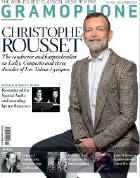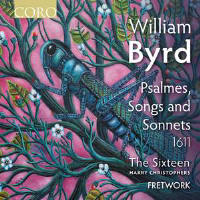Texte paru dans: / Appeared in: |
|
|
Recording of the month)
|
Outil de traduction |
|
With 2023 marking the 400th anniversary of William Byrd’s death, you might be expecting a surge in recordings of his sacred choral works, and if so, I would advise you strongly not to pass over this largely secular collection. It is an extraordinarily poignant release that will delight, distract and could also, potentially, recalibrate our thinking about the late, great Byrd. These Psalmes, Songs and Sonnets, which Byrd intended ‘to content every humour: either melancholy, merry, or mixt of both’, are his last full publication, and it’s somewhat surprising that although there are several well-known pieces here, the collection hasn’t before been presented in a single release. ‘This is deeply impressive consort-singing, the sort where the silence between the phrases is pregnant with meaning’ through the varying combinations of voices and viols that Byrd expected to likely be his swansongs? To perform this whole collection intact, The Sixteen have morphed from soloists and trios through varying combinations of voices to a full verse-anthem choir with viols, and along the way they have explored the extraordinary variety of moods and textures within. These remarkable late works may be something of a retrospective: madrigals rub shoulders with psalms, but they are all performed with much tender beauty and care, with each one carrying the hallmarks of Byrd’s impressive technique. In fact, it is striking to note just how pared-down the venerable composer’s late style can be, as if all that Tudor turmoil were distilled into. The year 1611 must have been a big one when you consider that it contained Shakespeare’s The Tempest and the King James Bible as well as this songbook from arguably England’s greatest Renaissance composer. Despite advancing age, Byrd was on particularly good form, even by his own standards, running a strikingly wide gamut of emotions throughout this collection. It’s telling that he himself described the pieces as ‘some solemne, others joyfull, framed to the life of the Words’. So what better ensembles than The Sixteen and Fretwork to navigate us the directness of ‘What is life, or worldly pleasure?’, which is sung with a gorgeous control of line and tone. This is deeply impressive consort-singing, the sort where the silence between the phrases is pregnant with meaning. Then there’s the slippery, modulatory five-voice ‘Come woeful Orpheus’, where Harry Christophers’s tempo navigates the ‘strange chromatic notes’ of both lyrics and music with a serenity that allows Byrd’s unusual harmonies to carry the message to a final, shimmering chord. Following this, the joyful and sprightly sopranos in ‘Sing we merrily unto God’ is one of my favourite tracks. Despite Byrd mixing joyful and solemn songs, it’s the joyful that really stand out. Yes, there are madrigals and quasi-madrigals here – most notably an elegant performance of ‘This sweet and merry month of May’ – but you will find no forced jollity or fa-la-la-ing in either this collection or these performances. Taking his cue from Byrd’s own apparent restraint, Harry Christophers combines genuine touches of excitement with serenity: listen especially for the infamous ‘warbling throats’ in ‘Awake mine eyes’, which Byrd scholar Kerry McCarthy suggests he must have been writing with his tongue in his cheek. The Sixteen clearly grasp the humour but, thankfully, don’t send it up. I particularly enjoyed the virtuoso threepart music, with bright, agile solo voices from The Sixteen emphasising the sparkling, soaring soprano parts and dexterous tenorwriting. There is also a world of contrasting emotion between, for instance, ‘In winter cold’ with text by Geffrey Whitney and the psalm-setting ‘Sing ye to our Lord a new song’, with its nifty triple rhythms. The singers are certainly animated by this music but never overwhelmed: despite several lines spanning two octaves and demanding much agility from each performer, it always sounds luminous and free. No mean feat. Fretwork perform the glorious four-part Fantasia with a rich tone and many neatly articulated phrases. They are, however, at their sumptuous best with Katy Hill in ‘O God that guides the cheerful sun’ and Elisabeth Paul in ‘How vain the toils’. Having loved their 2019 recording of ‘Turn our captivity, O Lord’ with Clare Wilkinson (Signum), I was delighted to find that an all-vocal performance here could be just as magical, the use of text on each part not distracting from the delicate, imitative opening at all. This is a landmark release finally addressing one of the most obvious oversights in Byrd’s recorded catalogue. It’s an exquisite album of unparalleled beauty that will bear repeated listening long past the anniversary year, and Kerry McCarthy’s generous essay makes a superb companion and guide.
|
|





